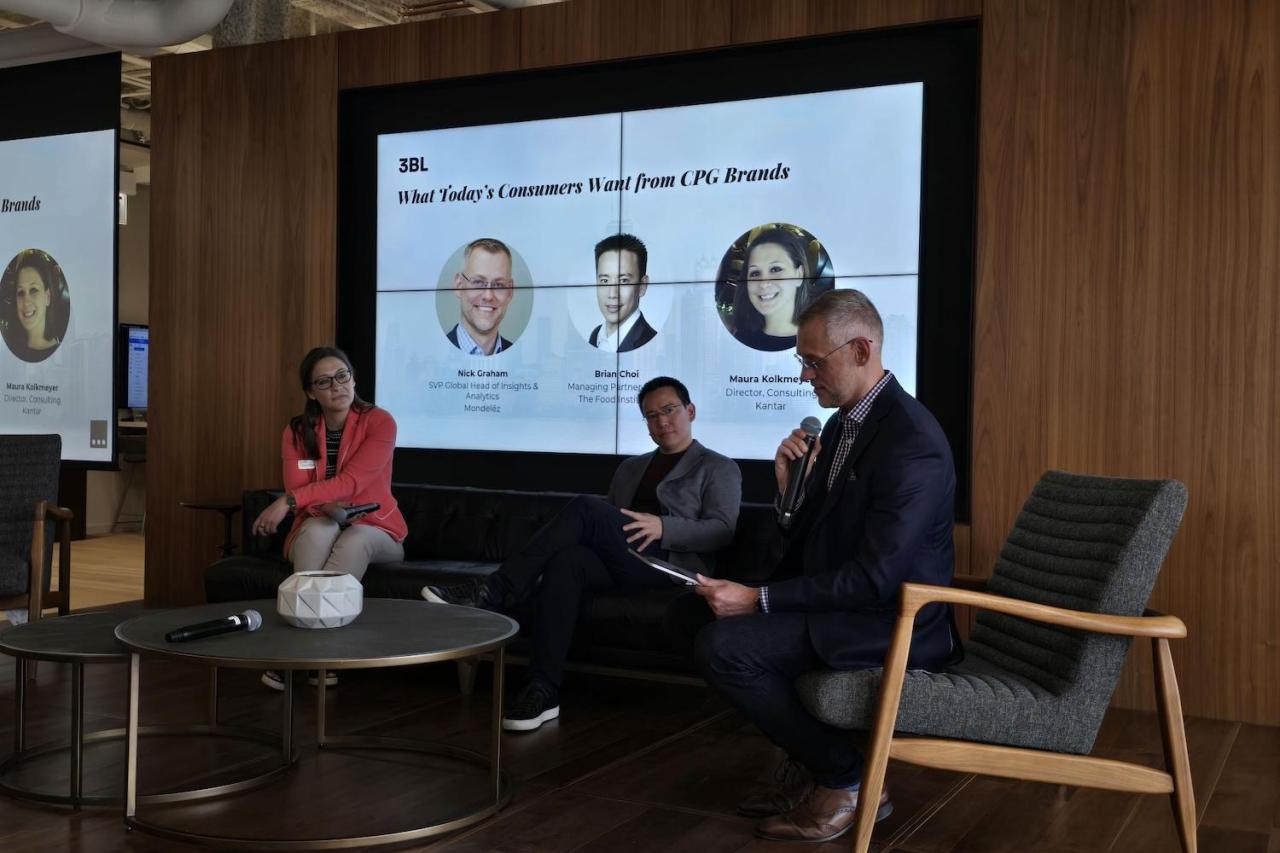Brand Leaders Share Their Insights on the Future of the CPG Sector
The press release details insights from a recent event at Mondelēz International's headquarters that discussed the future of the consumer packaged goods (CPG) sector. With economic volatility and changing consumer demands, innovation is critical. Mondelēz's State of Snacking report reveals that two-thirds of consumers prefer brands aligning with their values, and 63% seek environmentally friendly snacks. Despite this, a disconnect exists between consumer intentions and actions, often due to availability, price, or convenience issues. Leaders emphasized the need to simplify sustainability and enhance communication about product benefits. The event also highlighted the significance of understanding consumer behavior and leveraging scientific evidence to build trust and drive innovation.
- Mondelēz International's State of Snacking report shows 63% of consumers prefer environmentally friendly snacks.
- Leaders highlight the need for innovation and adaptability in the CPG sector.
- Emphasis on simplifying sustainability to increase consumer adoption.
- Mondelēz's commitment to understanding consumer behavior to inform product development.
- Event showcased the importance of scientific evidence in building consumer trust.
- Economic volatility creates a challenging environment for CPG companies.
- Disconnect between consumer intentions and actual purchasing behavior.
- Complexity of sustainability may hinder consumer adoption.
- Potential higher costs and availability issues for healthier, sustainable products.
NORTHAMPTON, MA / ACCESSWIRE / June 7, 2024 / Originally published by TriplePundit
Today's consumer packaged goods companies operate in a challenging and increasingly uncertain environment. Around the world, consumers are feeling the pinch from inflation and the rising cost of living, and a growing number are also searching for products that are healthy for their bodies, convenient for their lifestyles, and gentler on the environment.
Finding a way to deliver on shifting consumer demands is a constant balancing act for CPG companies. An eye toward consumer attitudes and lifestyles can help brands differentiate themselves on the store shelf while improving their impact on communities and the environment.
Business leaders discussed these trends and more at an event hosted at Mondelēz International's headquarters in Chicago earlier this month.
"The consumer has changed dramatically over the past five years," Brian Choi, managing partner and CEO of The Food Institute, a trade publication and information hub for the food sector, said at the event. "We're also in a period economically where things are quite volatile. Innovation is really needed."
Understanding what consumers want - and how to activate them
More than two-thirds of global consumers say they often choose brands that align with their values, according to Mondelēz International's fifth annual State of Snacking report. In particular, 63 percent seek out snacks with less environmental impact, including those with attributes like local and sustainably sourced ingredients, according to the survey.
Yet within consumer sentiment research, there's often a disconnect between what consumers say they're looking for and what they actually purchase. Particularly as people feel the strain economically and go about their busy days working and raising their families, it's often easier to grab whatever is closest and cheapest on the shelf.
It's understandably confusing to brand leaders when sales don't always match up with consumers' stated intentions to make the healthiest or most sustainable choice. But Maura Kolkmeyer, a director at the consulting firm Kantar, has a different view on the phenomenon that's often called the say-do gap.
"We have to be deeply, deeply curious about those tensions we see in the marketplace," she said at the event. "What you're actually seeing in that gap between the attitude and the action is uncertainty. Just because they're not acting on it doesn't mean they don't believe it."
In some cases, for example, consumers may head to the store and find the "healthier" or "more sustainable" product isn't available to them locally, is outside their price range, or requires extra steps they're not used to or comfortable with (think: having jars on hand to shop at a bulk station or bringing packaging back to the store to recycle).
"Maybe you're making it too complicated for them to act," Kolkmeyer said. "Maybe there's too much uncertainty between how they feel and what they want to do. How do you take out some of the uncertainty? Because uncertainty is a kiss of death in business and sales."
Susanne Mathis-Alig, senior director of sustainability at Mondelēz International, agreed. "The say-do gap is something our brands experience as well, and it's a very interesting opportunity," she said. "Sustainability is complicated, but we need to find the science and the art to make it simple."
Meeting the consumer where they are and communicating effectively
For brands that are listening, consumer attitudes and behavior can dictate how products are developed and brought to market. For example, while 88 percent of global consumers snack daily, nearly 70 percent say they do so mindfully, with an eye toward nutrition and portion control, according to Mondelēz International's State of Snacking report. Trends like these can signal to CPG companies a shift from the habits of the past, and those that listen position themselves better in the marketplace.
"When we start to look at why people are snacking, how they're snacking, that can really fuel the types of products that we make," said Sandy Morreale, a registered dietician and manager of nutrition strategy and communications at Mondelēz International. "They're looking for snack choices that are going to meet their nutrition and needs."
But to recognize brands for their healthier shifts, consumers first have to know about them. That can be a challenge in itself, as many brands shy away from scientific communications related to things like nutrition for fear of boring or confusing the customer into apathy. As consumer attitudes change, brand leaders are starting to think differently.
"Science can be sexy," said Michele Lefebvre, a registered dietician and nutrition and wellbeing manager at Barilla America. "We lean away from scientific communications … but it can be sexy. Partnerships with dieticians can help companies understand the ways we can really excite the consumer with this information."
Leaning into the evidence behind brand health and sustainability claims can also foster trust with consumers. For example, Edelman's most recent Trust Barometer shows low levels of trust for large multinational companies and their executives, but consumers still rightfully trust scientists and experts to be straightforward in what they say.
"With nutrition specifically, there is a whole lot of pseudoscience out there and disinformation," said Adelaide Feuer, a registered dietitian and EVP of the Edible specialist agency within Edelman. "For large companies … trusted science needs to be the backbone."
While accuracy is vital, framing matters, too. For sustainability conversations in particular, "We need to shift away from framing the problem of sustainability and climate as an existential threat that is so large and overpowering," said Simonne Dubois, director of foresight at Kantar.
"That tries to motivate people from a place of fear, and it actually makes people feel overwhelmed," she said at the event. "They shut down. And that's not a way to actually drive change. Instead, what we need to do is to start returning agency to consumers and help give them the tools to take small sustainable actions so they feel like their actions have an impact and they are making a difference."
Driving innovations that meet the moment and look toward the future
With consumer demands shifting quickly, brands are challenged to keep up. But those that stand to succeed for the long term also have a firm eye on future trends, demands, and challenges that impact the consumer and the global food system.
"In the pace of the world we live in, especially in what we might call the TikTok environment, there's a space for creative innovations that happen fast," said Amy Jones, VP of research and development for Griffith Foods in North America. "But when it comes to the moonshot, maybe what we would call breakthrough innovations, these are things that consumers or customers may not even know they need yet."
This dichotomy is something Nick Graham, SVP of insights and analytics for Mondelēz International, knows well. Mondelēz brands drop new products on an ongoing basis, with a goal to meet each individual with "the right snack, in the right place, at the right time" - whether that's a shareable bag of Oreos, a gluten-free version, or a gift set for customers to celebrate birthdays and graduations. But the company is also always looking toward what's next.
"You have to really think ahead: What's the problem? I may not even quite know what the problem is yet," Graham said. "We have to make sure that those big problems we're trying to solve, we're spending much more time up front to really understand the consumer attitude: What's the tension, what's the problem, and what are the potential solutions we could look at?"
For an ingredients manufacturer like Griffith Foods, that may mean exploring new ways to source sustainably, looking toward technologies like 3D printing to diversify plant-based proteins, or re-approaching time-honored techniques like fermentation to make foods taste better with less salt and sugar. For food companies like Mondelēz International, it may take the form of SnackFutures, an independent innovation and venture hub inside the company that aims to "disrupt the snacking industry."
Whatever way you slice it, food innovation means trying new things, listening to the customer, and getting comfortable with trying and trying again. "As long as you learn from it and you build from it, you haven't failed," Graham said.
This event coverage is sponsored by Mondelēz International and produced by the TriplePundit editorial team.

View additional multimedia and more ESG storytelling from Mondelēz International on 3blmedia.com.
Contact Info:
Spokesperson: Mondelēz International
Website: https://www.3blmedia.com/profiles/mondelez-international
Email: info@3blmedia.com
SOURCE: Mondelēz International
View the original press release on accesswire.com







